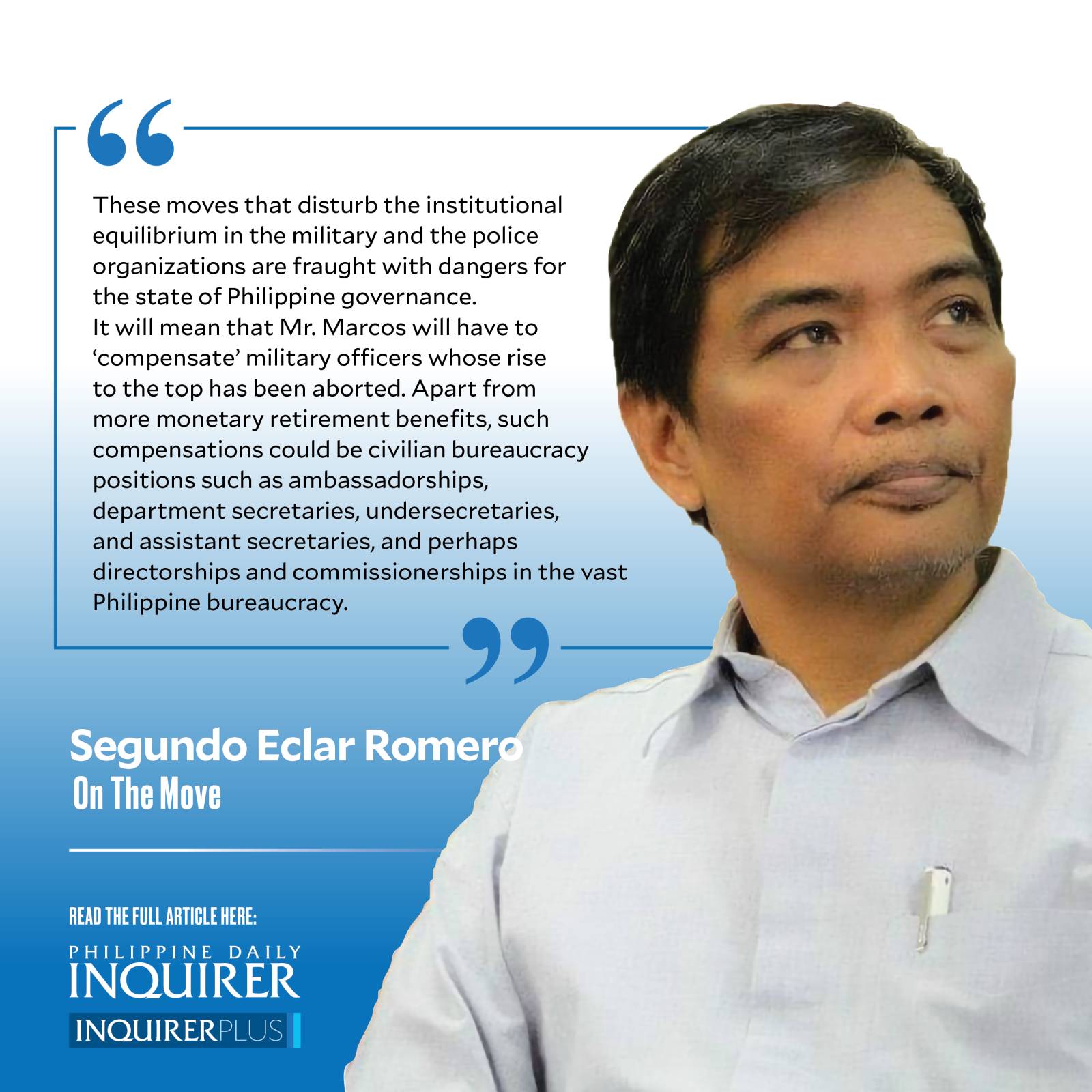Pitfalls in reforming PNP and AFP
President Marcos Jr. had the first opportunity to make sure Republic Act No. 11709, which fixes the term of the Armed Forces of the Philippines (AFP) chief of staff and other top military officers to three years, will be followed. In early July, then Press Secretary Trixie Cruz Angeles said that Mr. Marcos will follow the law and keep AFP Chief of Staff Lt. Gen. Andres Centino until the end of his fixed three-year term, which should have ended on Nov. 12, 2024.
We all know this did not happen, and worse, Mr. Marcos not only hastened the revolving door process by precipitously replacing Centino with Lt. Gen. Vicente Bacarro in August last year but also mangled the process by turning around to replacing Bacarro with Centino in January this year.
Article continues after this advertisementThe three-year rule creates a bottleneck and cap to the military career pipeline, making the chief of staff and other positions out of reach to many officers. A regular transition into three-year terms was difficult enough, especially since there were 11 chiefs under Rodrigo Duterte. If the law is followed, Mr. Marcos will only have two. So far, he already has three—Centino I, Bacarro I, and Centino II. There is no guarantee that he will keep Centino for a full three years (until January 2026).
These moves that disturb the institutional equilibrium in the military and the police organizations are fraught with dangers for the state of Philippine governance. It will mean that Mr. Marcos will have to “compensate” military officers whose rise to the top has been aborted. Apart from more monetary retirement benefits, such compensations could be civilian bureaucracy positions such as ambassadorships, department secretaries, undersecretaries, and assistant secretaries, and perhaps directorships and commissionerships in the vast Philippine bureaucracy. This will further unduly militarize civilian positions, contrary to the recommendations of the Davide Commission of 1989, which studied and recommended ways of returning the military to the barracks.
The dangerous consequence of the courtesy resignation gambit lies in simply retiring erring police generals and colonels without “neutralizing” and making them accountable for their misdeeds. This path of least resistance is the mistaken appeasement policy that the rogue cops should go “quietly.”
Article continues after this advertisementWell, once in civilian life, these ninja generals and colonels will continue and expand the drug and crime resources, networks, and systems they have developed while in the service. To buy protection for themselves, they will easily cross over into politics, becoming provincial governors and mayors. With drug and crime money, they will elbow out the old local dynasties and start their own. How many rogue police governors and mayors have been identified in the various drug matrices that Duterte bandied about during his term as president?
It is a mistake to look only at the consequences of reforms in the military and the police on the careers and interests of individual officers who are affected. It is more important to look at the overall institutional capacity, coherence, strategic purpose, integrity, and reliance of the whole organization. The whole is more than the sum of its parts.
The Philippine National Police and the AFP as institutions have seen better images of their professionalism and integrity. In 2008, the Ombudsman and the Development Academy of the Philippines initiated a program called the Integrity Development Review, a preventive measure against corruption. It entailed a systematic assessment of the agency’s corruption resistance mechanisms and its vulnerabilities to corruption.
It is interesting to note that when applied to an initial 16 government agencies—the BIR, BOC, DPWH, PNP, LTO, AFP-PN, BuCor, BFP, DAR, DENR, DOH, NIA, LRA, LRTA, DBM-PS, and PVAO—the AFP ranked third and the PNP ranked fourth in an extensive and rigorous review that covered leadership, code of ethics, gifts and benefits policy, human resource management, performance management, procurement management, financial management, whistleblowing, internal reporting, and investigation, corruption risk management, and managing the interface with the external environment. (See: https://bit.ly/3ZFr9v1)This is the kind of strategic institutional analysis that the Marcos Jr. administration should engage in to balance tactical personnel and career concerns relating to military and police reform. Political nearsightedness will deeply damage the capacity of the government to deliver on long-term national goals. We must remember the warning of Murphy’s Law: “The light at the end of the tunnel is the headlamp of an onrushing train.”
doyromero@gmail.com

















